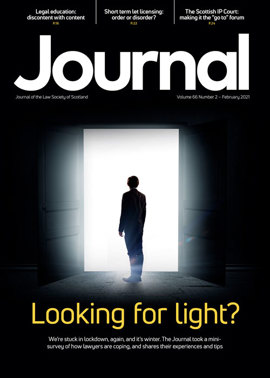New approach for sex offence victims
The Forensic Medical Services (Victims of Sexual Offences) (Scotland) Act 2021 was unanimously passed by the Scottish Parliament on 10 December 2020 and received Royal Assent on 20 January 2021, becoming the first dedicated Forensic Medical Services Act in the UK.
The word “Medical” is significant, since the FMS Act clarifies the legal position of the health boards responsible for the provision of healthcare and forensic medical examination for victims of sexual crime in Scotland, via healthcare professionals employed or contracted by them. The bill was steered through the Scottish Parliament by the Cabinet Secretary for Health and Sport, Jeane Freeman, with lead scrutiny by the Health & Sport Committee. MSPs welcomed the health policy focus of the legislation, including a statutory requirement for trauma-informed care. How, then, to ensure that sight was not lost of the Scottish criminal justice system’s needs in terms of robust, high quality forensic evidence?
Taskforce support
Close coordination between health and justice partners is secured through the Chief Medical Officer’s Rape & Sexual Assault Taskforce, established in 2017 in response to a report on forensic medical services by HM Inspectorate of Constabulary. This taskforce, chaired by Dr Gregor Smith, championed the development of the bill and will support the implementation of the FMS Act. Backed by £10 million of Scottish Government funding over four years, a Sexual Assault Response Coordination Service (SARCS) is being developed in each health board in Scotland, delivering a vision of person-centred, trauma-informed care.
To ensure a consistent, national approach to the delivery of these services, a package of resources was launched in November 2020. It includes clinical pathways for adults, children and young people respectively, as well as national forms and data sets to ensure that performance against Healthcare Improvement Scotland quality indicators can be closely monitored and reported to the Parliament annually under s 15 of the Act.
A key taskforce achievement to date is that forensic medical examinations of victims now take place in an appropriate healthcare setting, and no longer in police stations. Building on this important development, the FMS Act will require all health boards to offer “self-referral” services to victims aged 16 or over. This means that a victim can access healthcare and examination without having previously made a police report.
MSPs warmly welcomed the self-referral provisions of the bill, and endorsed the proposition that self-referral empowers victims, giving them greater choice which may positively influence their decision to report the crime to police and encouraging those who may be reluctant to make a police report to access appropriate NHS services. It is however expected that many victims will still access services via the traditional “police referral” route. The Act gives statutory underpinning to that and in so doing replaces the relevant parts of a 2014 memorandum of understanding between Police Scotland and health boards.
Evidence focus
In line with the standard Scottish Parliament bill process, written evidence on the bill was provided by interested bodies including the Law Society of Scotland and Faculty of Advocates; the Society also provided oral evidence. The bill was amended at stage 2 to adopt some of the suggestions made by each professional body: an improved definition of “evidence” suggested by the Society, and a “cooling-off period” where a victim requests the destruction of self-referral evidence provided by them, as suggested by the Faculty.
The fine details of how a consistent, national model of self-referral will operate will be set out in a formal protocol under development by the Chief Medical Officer’s taskforce, to be approved by the Lord Advocate in due course. A particular aspect of self-referral services, to be determined by regulations, is the retention period for evidence collected in the course of such services. The Scottish Government has recently launched a 12-week consultation on a proposal to prescribe 26 months (two years, two months) as a proportionate period. Interested practitioners are encouraged to review the consultation paper and contribute views.
To support the aims of the FMS Act, NHS Education Scotland delivers “essentials” training to the doctors who examine victims and the nurses who support them. This training has helped to increase the numbers of female sexual offence examiners; it includes best practice on trauma-informed care and the requirements of the Scottish criminal justice system. To complement this ongoing health sector training work, the Chief Medical Officer’s taskforce is initiating a Justice System Training short life working group to ensure legal professionals with an interest in the Act are aware of it and have confidence that reforms to service delivery continue to secure the chain of evidence and the integrity of the criminal justice system.
It is hoped this article has made some contribution to raising awareness of Scotland’s healthcare-focused model of forensic medical service for victims of sexual crime, now enshrined in landmark legislation.
More information
For further information and background, including a link to the secondary legislation consultation, see Violence against women and girls (VAWG), on gov.scot
Regulars
Perspectives
Features
Briefings
- Criminal court: Discount season
- Family: Capital values in uncertain times
- Employment: Can employers require staff vaccination?
- Human rights: Protecting the child claimant
- Pensions: a bill with teeth
- Charities: commerce as public benefit?
- Property: Playing safe: on the right track?
- In-house: Wide world of in-house
In practice
- Priorities for our Parliament
- The Word of Gold: The gift that keeps on giving
- TRS: more trusts, more information, more access
- A proper conclusion
- The Eternal Optimist: Putting resolve into resolutions
- Appreciation: Professor Emeritus Robert Rennie
- Ask Ash: Trainee in a rut
- Royal Faculty invites new members







